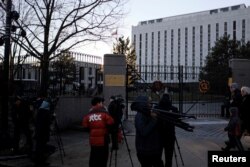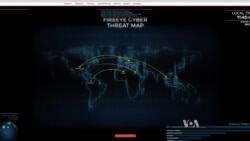President Barack Obama on Thursday hit Russia with new sanctions over its computer hacking and interference in the November presidential election and other Russian actions, including harassing U.S. diplomats in Moscow.
Obama called his actions "a necessary and appropriate response to efforts to harm U.S. interests in violation of established international norms of behavior."
Among the actions the president ordered were sanctions against nine Russian individuals and entities: two Russian intelligence services, the GRU and FSB; four officers of GRU; and three companies that provided material support to the GRU.
In addition, Evgeniy Bogachev and Aleksey Belan were also sanctioned. The Treasury Department called them "notorious criminals" who were responsible for the cybertheft of more than $100 million from U.S. banks and other American firms.
35 expulsions
Thirty-five Russian government officials in Washington and in the consulate in San Francisco were given 72 hours to leave the United States for "acting in a manner inconsistent with their diplomatic status and consular activities."
Russian officials also will be denied access to what the U.S. State Department calls two Russian government-owned recreational compounds in Maryland and New York. This was ordered after U.S. diplomats in Moscow were harassed and even physically assaulted.
"In addition to holding Russia accountable for what it has done, the United States and friends and allies around the world must work together to oppose Russia's efforts to undermine established international norms of behavior and interfere with democratic governance," Obama said in announcing the sanctions.
A senior White House official said Thursday's publicly announced actions were not the end of the American response. He said there would be other measures that wouldn't be publicized.
The official said there had been no debate within the Obama administration over whether Russia indeed interfered in the presidential election, primarily by hacking Democratic Party emails to try to harm Hillary Clinton's campaign and boost Donald Trump's chances of winning the November 8 election.
The official said the White House believed Russia would try to interfere in elections in other countries.
He also said he had no reason to believe Russia would not try the same thing in future U.S. contests. The next major American election will be in 2018, for the entire House of Representatives and a number of Senate seats.
No surprise
The Obama administration had warned the Kremlin numerous times in public and private that it knew what Russian hackers were up to and that Thursday's sanctions should not come as a surprise to anyone.
It also said it was inconceivable that Russian President Vladimir Putin knew nothing about it.
Watch: How Do Experts Know Russians Hacked the Election?
A Kremlin spokesman said Russia was considering an "appropriate" retaliation and accused the United Sates of trying to destroy ties with Moscow.
President-elect Trump, who has made no secret of his desires for better ties with Moscow, responded to the sanctions by saying it was time for the country to "move on to bigger and better things." But he intimated that he still had doubts about Russia's involvement in the election.
"In the interest of our country and its great people, I will meet with leaders of the intelligence community next week in order to be updated on the facts of this situation," Trump said in a statement.
Congressional opposition
Emma Ashford, a foreign policy expert from the Cato Institute, told VOA that Trump would face a lot of opposition from Congress if he tried to undo the sanctions.
"Part of why this has been so difficult for the Obama administration is they were also trying to find something that Trump could not on his first day in office undo," Ashford said.
She added that the Obama administration must "try to send a signal that no matter what Donald Trump might say about how much he likes Vladimir Putin and how we're going to improve relations with Russia, that there has to be some sort of penalty for what the Russians tried to do in the election."
A State Department official said Thursday that reversing Obama's orders would be "inadvisable," adding that it made no sense to invite Russian intelligence officials back into the United States.
Thirty-five is the second largest number of Russian diplomats ordered out of the United States at one time since the end of the Cold War.
President George W. Bush expelled 50 Russians in March 2001 for alleged spying.
President Ronald Reagan deported a total of 80 Russian diplomats also suspected of spying during the fading years of the Cold War in 1986.
Elizabeth Chernoff contributed to this report.







